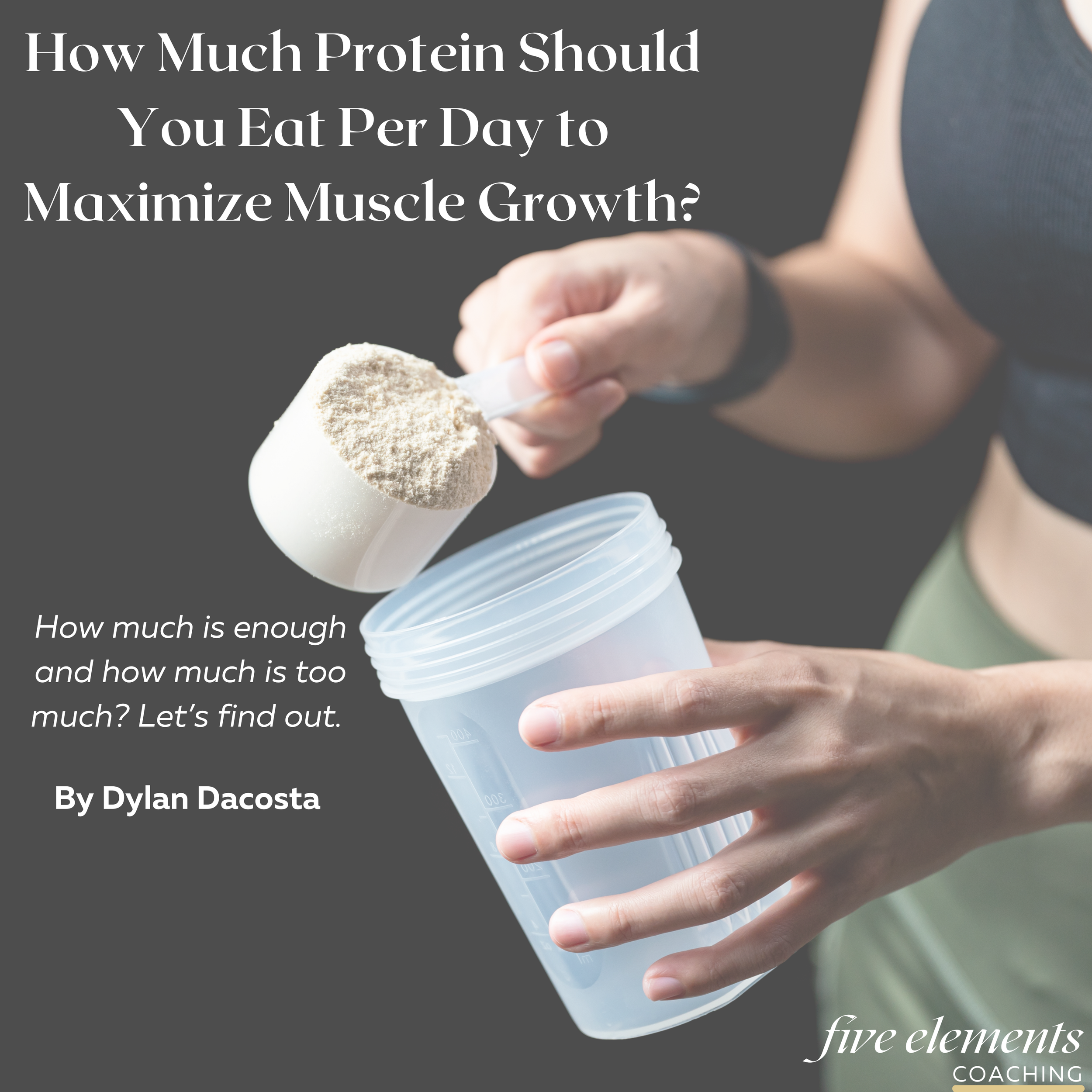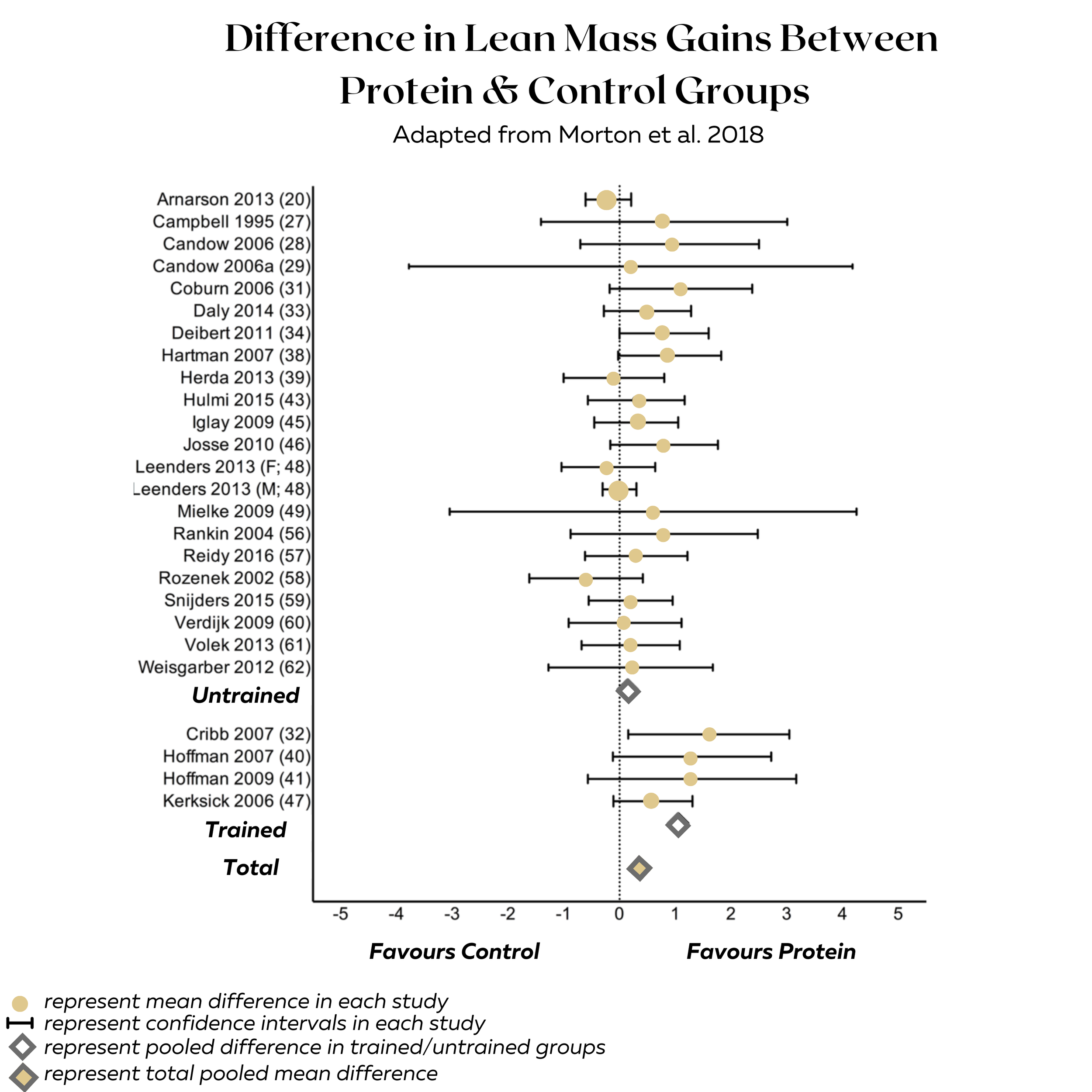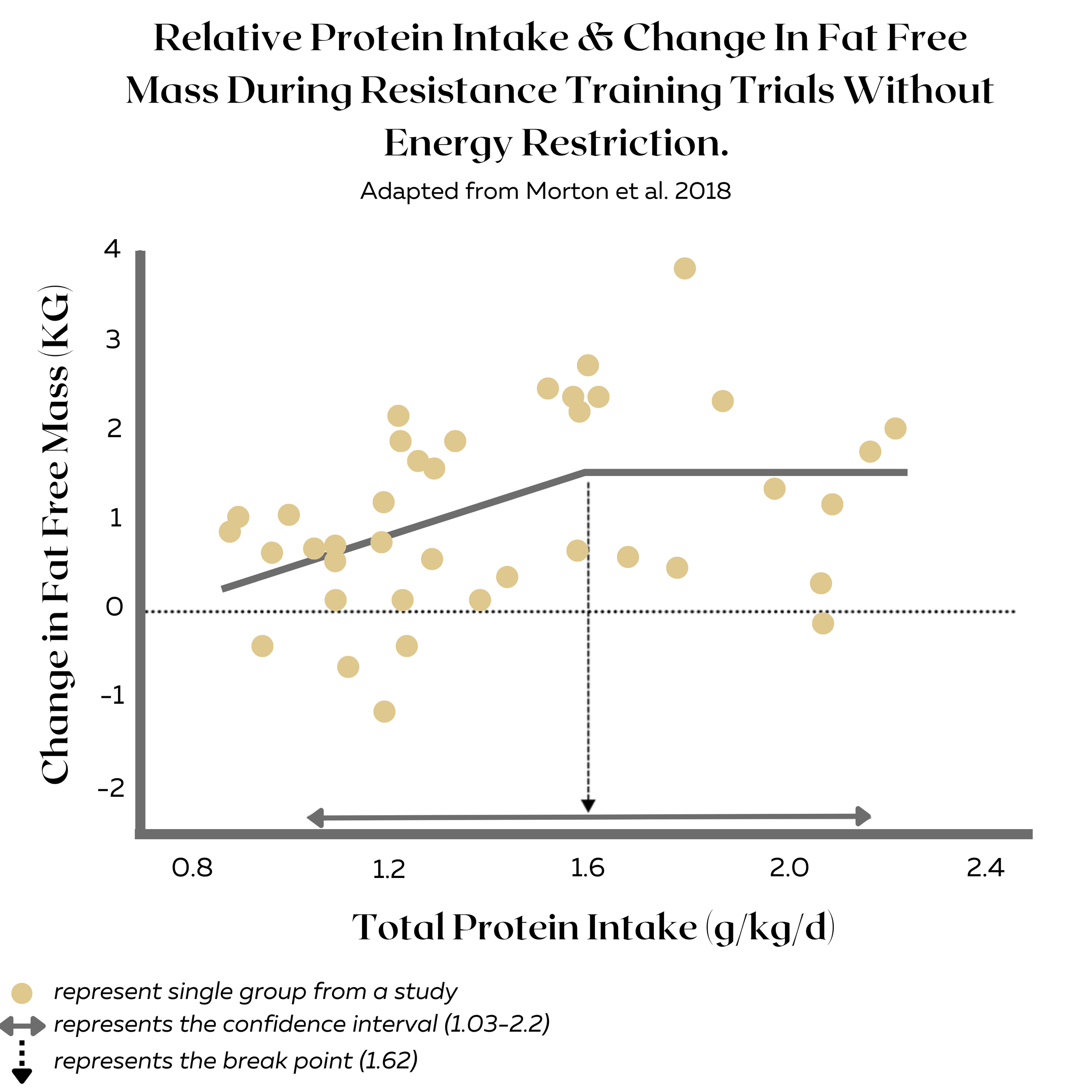How Much Protein Should You Eat Per Day to Maximize Muscle Growth?
How much is enough and how much is too much? Let’s find out.
Spark Notes:
When it comes to achieving greater gains in lean mass during resistance training trials, protein supplementation groups experience greater gains than controls.
More trained folks see a larger benefit from higher protein intakes than less trained folks did in these trials.
A sub-analysis of this data showed that beyond intakes of 1.6 g/kg/bw, (upper confidence level of 2.2 g/kg/bw) no greater gains in lean mass were observed.
A range between 1.6–2.2 g/kg/bw of protein is likely an optimal daily target if you’re not energy restricted and looking to maximize gains in lean mass.
With all of this in mind, resistance training is still the main driver for gaining muscle mass — adequate protein intake will only help augment those gains. So if you can’t hit these targets, you can still make meaningful gains.
How much protein do you eat per day? Regardless of your answer, I’m willing to bet somebody out there would tell you that it’s too much, while someone else would tell you that it’s too little.
Protein targets and suggestions seem to be all over the place. Sometimes for good reason, as optimal protein targets may change depending on your goal, but also do to some confusion and lasting legacy of some bro science takes that still travel around, from gym to gym.
With all that in mind, today I want to help you set up what your ideal protein intake will be if you’re aiming to maximize muscle growth. So this will be in the context of being at calorie maintenance, or in a surplus. I mention this because you’ll generally want avoid being in a calorie deficit if your goal is to maximizemuscle growth. Secondly, protein intakes may need to be slightly higher if you’re in a calorie deficit and aiming to maintain, or even build muscle — especially if you’re more trained and leaner.
So let’s establish what your target should be if you’re not in a calorie deficit and trying to maximize those gains.
If we take a look at systematic review by Morton et al. in 2018, we get a pretty nice picture as to what we should aim for.
They meta-analyzed 49 randomized controlled trials, spanning 17 countries, with a total of 1863 participants. 10 studies were on folks who had been strength training prior to the studies and 14 studies were made up of only females. The average age of the entire pool was also 35. So this data was a little more diverse than a lot of exercise science research.
All studies involved spanned from a minimum of 6 weeks, all the way up to 52 weeks long. Here is a brief breakdown of the average training protocols of all trials involved:
3 sessions per week, with a standard deviation of 1 session.
7 exercises per session, with a standard deviation of 3 exercises.
4 sets per week, with a standard deviation of 2 sets.
9 reps per set, with a standard deviation of 4 reps.
This was not what all trials did. There was plenty of variation between all trials, but these were just the averages.
When it came to protein intake, all studies involved had one group that was given protein supplementation as well. Wide ranges were seen here too, but the average supplementation group given was 36 grams (SD of 30g) of protein per day.
Part of this review was to see whether protein supplementation aided in greater gains in lean mass and strength than the control groups not being supplemented with.
They found that protein supplementation did increase strength slightly more in the protein supplementation group. Interestingly, while the untrained folks did see a trend toward more strength gains (0.99 kg increase in 1RM) when supplemented with over the control group, the difference wasn’t quite significant or very meaningful. While the trained folks did see a statistically significant and decently meaningful increase in 1 rep max strength, when supplemented with protein over the control groups (4.27kg greater in 1RM.)
When it came to the effect of protein supplementation on gains in lean mass, a similar trend was seen. The untrained pooled data showed a trend towards favouring the protein group (0.15kg greater gains in lean mass), but once again wasn’t statistically significant, or very meaningful. While the trained group had statistically significant greater gains than the control group, with those gains being more meaningful too (1.05 kg greater gains).
The total gains in lean mass was still significant in favour of the protein supplement group (0.3 kg greater gains), but just to a smaller degree than in the trained sub-group.
One interesting note worth sharing, is that strength training alone explained most of the gains in lean mass. According to that forest plot above, resistance training in general lead to an average of 1.1 kg of fat free mass gained, and the protein groups increased those gains by another 0.3 kg. I’ll take those extra gains all day, but it’s worth noting that if you don’t hit optimal intakes, you can still make great gains in strength and muscle mass.
Based off of this, it’s safe to say that increasing protein intake is a no doubter for both maximizing strength and muscle gain — while the gains in strength seemed to be less meaningful than gains in lean mass. 4 out of 22 studies on untrained folks had mean differences in favour of the control group for gains in lean mass, while 17 had mean differences in favour of the protein supplementation group for gains in lean mass. Lastly, one study seemed to be a complete tie. So even you’re untrained and the gains are marginal, there is no real downside to increasing your protein. And if you are more trained, then it’s likely you already focus on getting adequate protein, but this seems to be even more helpful to you.
Now, the question is, how much protein should you aim for?
Luckily, this review compiled the data from all the studies where total protein intake per day was collected and ran a regression to see at what point higher protein intakes seemed to stop explaining larger gains in lean mass. This involved 42 study groups and 723 participants.
They found the breakpoint to be at about 1.6 grams of protein per KG of bodyweight per day. Beyond that, there wasn’t a further trend up in terms of higher protein intakes leading to greater gains in lean mass.
The upper limit of the confidence level for the breakpoint was 2.2 grams of protein per KG of body mass per day.
Because of this, a range of 1.6–2.2 grams of protein per KG of body weight per day seems to be the optimal range to maximize muscle growth, while not being energy restricted.
In short, the confidence level (95% in most cases) is a calculation that gives a level confidence that the true mean would fall within a certain range, 95% of the time. The 95% CI for the breakpoint analysis above was 1.03–2.2. This means that we’d expect the breakpoint to be between these two numbers about 19 out of 20 times, if this experiment were to be repeated 20 times. It doesn’t make much sense to shoot below 1.6 based on this data, so a range of 1.6–2.2 makes the most sense if you’re aiming to eat optimal protein intake to maximize muscle growth, based on this data.
Will this range be optimal for everybody?
I think for a lot of folks, this will be an optimal range to work within. There are a few exceptions to keep in mind of course.
If you’re in a calorie deficit, you may want to slide higher on this range, or even slightly above it. As I mentioned above, if you’re more advanced/leaner, some evidence suggests upping to 2.4 g/kg/bw per day, while dieting.
If you have a high bodyweight with a higher body fat %, this range might be overkill (especially the higher end of it.) If you’re 300 pounds at a high body fat percentage, I doubt you need a minimum of 240 grams of protein to optimize muscle growth — especially if you’re not a more experienced trainee. You can easily just lower the scale a bit to 0.6–0.8 and you’ll likely be fine. Alternatively, if you’re aiming to lose body fat from that position, you can actually use this scale on your target body weight. If you wanted get down to 220 lbs from 300 lbs, you could aim for 0.7–1.1 g/lb/bw of protein per day (imperial translation) using the weight of 220 lbs. This would likely give a more reasonable target too.
If you’ve been at the higher range and want to explore higher intakes and see if it helps with your gains — even it’s just a little bit. This range seems to be effective for most folks, but as always, that doesn’t mean it will be optimal for everyone. There is some evidence that even higher intakes may help improve body composition in more trained folks, (up to 3.4 g/kg/bw per day) so exploring a little higher may help slightly. It’s just worth noting you shouldn’t expect higher intakes to elicit better gains beyond that point, so this is more of a “have at’er and see what happens” caveat. Lastly, if you go excessively high with your protein intake, your carb and fat intake may have to be even lower, which may negatively impact your performance in the gym, or even how much you enjoy your diet overall.
All in all, I think the range of 1.6–2.2 grams of protein per KG of bodyweight per day (about 0.7–1.1 grams of protein per pound of BW in imperial units) will be optimal for most folks looking to maximize their gains while strength training, while not being in an energy deficit.
Generally speaking, the more trained you are and/or the more lean you are, the higher you’ll likely want to aim on that scale. The less trained your are and/or the higher your body fat % is, the lower you can likely go on that scale.
Combine these protein intakes with some challenging resistance training and you’ll be in a great spot to maximize those gains.
Cheers,
Coach Dylan 🍻
References:
1. Energy deficiency impairs resistance training gains in lean mass but not strength: A meta-analysis and meta-regression
https://pubmed.ncbi.nlm.nih.gov/34623696/
2. A systematic review of dietary protein during caloric restriction in resistance trained lean athletes: a case for higher intakeshttps://pubmed.ncbi.nlm.nih.gov/24092765/
3. A systematic review, meta-analysis and meta-regression of the effect of protein supplementation on resistance training-induced gains in muscle mass and strength in healthy adultshttps://pubmed.ncbi.nlm.nih.gov/28698222/
4. A high protein diet (3.4 g/kg/d) combined with a heavy resistance training program improves body composition in healthy trained men and women — a follow-up investigation
https://jissn.biomedcentral.com/articles/10.1186/s12970-015-0100-0





